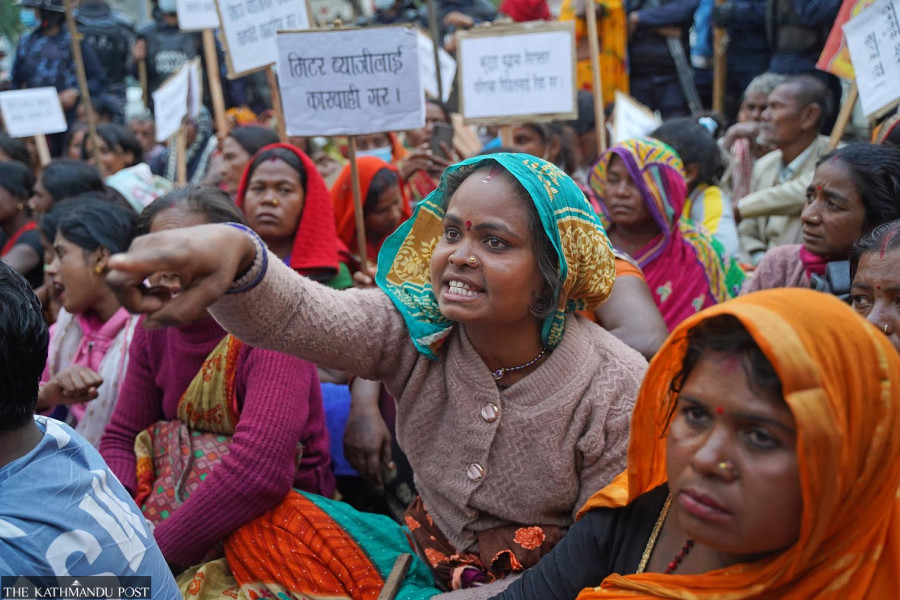National
Concerns over implementation of agreement between the government and loan shark victims
Another group of people who are victims of unscrupulous lending announce a separate protest programme.
Prithvi Man Shrestha
A day after a group of loan shark victims signed a five-point agreement with the government to end their protests, another group of victims criticised the deal, arguing that it would only put them in more trouble.
The group of the victims coming from the eastern Tarai on Saturday decided to call off their agitation after the government promised to form a high-powered commission to solve their problems.
But another group of loan shark victims who had signed a similar agreement with the government in September last year said the formation of the commission would only prolong the problems instead of solving them.
Issuing a statement on Sunday, Farmers-Workers Struggle Committee against Loan Sharking and Frauds, which had signed a similar agreement with the government last year, criticised the decision of forming the commission instead of introducing the law against the lenders charging exorbitant interest rates.
“The lands of the farmers are being auctioned off in the absence of the law," the statement says. It also stressed the need for declaring the documents signed by borrowers to receive loans from such lenders as illegal, freezing all the cases filed by the loan sharks against the borrowers and reviewing the court verdicts that favoured the money lenders.
This struggle committee representing the victims mainly from western Tarai also announced the protest of its own starting on Monday.
As per the agreement signed with the victims hailing from eastern Tarai on Saturday, the government will expedite the process to amend the laws to criminalise unscrupulous lending.
It was also agreed to recommend to the government the formation of a district-level coordination/facilitation committee led by the chief district officer to address complaints related to loan-sharking.
The committees will have police personnel, district government attorneys, heads of land revenue and survey offices, representatives of banks and financial institutions and representatives of loan victims as members.
Such committees will facilitate the works of the commission, register complaints and grievances from victims, help in evidence gathering, provide legal aid and conduct awareness activities.
The deal has not convinced lawmakers either. Speaking at the House of Representatives on Sunday, CPN-UML MP Thakur Gaire criticised the government’s decision to form a commission as an attempt to confuse the victims and save the lenders.
“The victims of loan sharks have been deceived once again,” he said. “Another commission has been formed after shelving the report of a similar body.”
Responding to the concerns of the lawmakers on the matter, Deputy Prime Minister and Home Minister Narayan Kaji Shrestha said the government was determined to give the victims justice by penalising the loan sharks.
He said the next Cabinet meeting would introduce a bill to amend the law to criminalise loan sharking and initiate legal action against the lenders and form a high-powered commission to study the complaints. “Based on the commission’s recommendation, necessary action will be taken against the loan sharks,” Shrestha said.
Even though the government had promised legal amendments to criminalise loan sharking in September last year, it has failed to do so. The new government said it has initiated internal discussions on amending the Criminal Code to criminalise unscrupulous lending after the new protests erupted.
There is the history of many reports of commissions not being implemented, giving room for doubt if the government’s move is just a ploy to confuse the victims and perpetuate the problem.
Former Special Court chairperson Gauri Bahadur Karki, who had headed a few high-level commissions formed by the government, said such panels are formed mostly to pacify the immediate anger instead of solving problems.
Karki, who had headed the commission formed to probe the operations and possible irregularities in cooperatives about a decade ago, said the government only partially implemented the commission’s recommendation.
“We had recommended the introduction of a new Cooperative Act but some weaker regulatory provisions than our recommendations were introduced,” he said, adding that few efforts were made to ensure the recovery of depositors’ money.
Karki ,who also headed the high-level commission probing irregularities in medical education in July 2018, had recommended action against 43 individuals including top Tribhuvan University officials, former Nepal Medical Council officials and senior doctors and professors for their dubious roles in granting affiliations to medical colleges, conducting entrance examinations, setting up fee structures, allocating seats and inspecting colleges.
But the report was not made public for years while hardly any action was taken against the accused. “We had suggested removal of TU vice-chancellor Tirtha [Raj] Khaniya but no action was taken against him given his political connections,” said Karki. “In this backdrop, it is only natural to suspect the government’s intent as regards the issue of loan shark victims.”




 8.22°C Kathmandu
8.22°C Kathmandu














